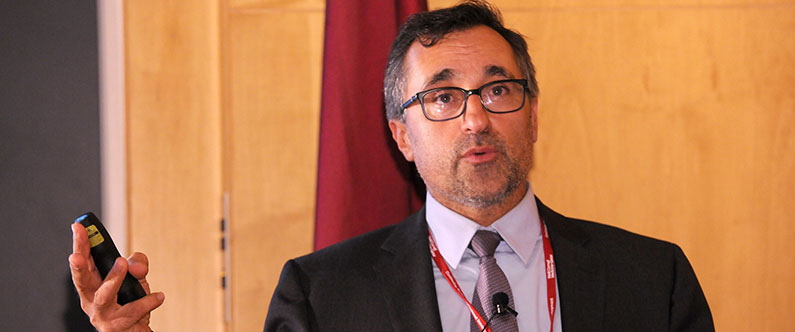Improving patient care discussed at Grand Rounds
 Dr. Peter Kaboli visited WCM-Q to speak about ways to drive quality improvements in patient care.
Dr. Peter Kaboli visited WCM-Q to speak about ways to drive quality improvements in patient care.
Strategies to translate rigorous research into decisive action in order to improve patient safety in hospitals were discussed at the latest installment of WCM-Q’s Grand Rounds series.
Visiting expert Dr. Peter Kaboli, chief of medicine, Iowa City VA Hospital and professor of internal medicine, University of Iowa Carver College of Medicine, said that it was crucial for efforts to improve patient care to be grounded in very thorough research, and for the results of improvement strategies to be carefully monitored and analyzed.
He said: “When I first became involved in quality improvement in hospitals, I felt there was a tension between those who demanded changes be made quickly – the ‘get it done by next Tuesday’ group – and those who favored a research-based approach that often took so long that the impetus for change had passed by the time the results were returned.
“The key for making real improvements to the quality of care is to eliminate the disconnect between decisive action and rigorous research. Quality improvement measures need to be based on rigorous research that are translated into clear recommendations and strategies, which are then implemented and followed-up with monitoring and evaluation to see if they actually lead to improved care and patient safety. This continuum, which is based on a very close working relationship between researchers and clinicians is therefore very important.”
Dr. Kaboli, who was speaking at WCM-Q to an audience of physicians, pharmacists, nurses, medical educators, students and other healthcare providers, described a number of cases where quality improvement research had been used effectively. These included studies to determine the optimal length of stay in hospital for patients, to analyze the effectiveness of remote telemedicine consultations for HIV patients, and to assess several different protocols for coordinating multidisciplinary patient care.
He said: “Multidisciplinary care is a very good target for research-based quality improvement because it often draws together large and diverse teams that comprise doctors, nurses, other health professionals, social workers and others, each of whom have very different schedules and workloads. Using quality improvement research we have been able to test several different systems to see what works best for coordinating care.”
The activity was an Accredited Group Learning Activity (Category 1) as defined by the Qatar Council for Healthcare Practitioners-Accreditation Department and was approved for a maximum of 1.00 hours.
Dr. Amine Rakab, assistant professor of clinical medicine and assistant dean for clinical learning at WCM-Q, said:
“We are delighted to welcome Dr. Kaboli to Qatar to share with us his very important insights into quality improvement and patient care. As we all know, these are continuous processes that never end, so we can all learn a great deal from him to help ensure our patients receive the best quality care in the safest possible environment.”
Dr. Peter Kaboli visited WCM-Q to speak about ways to drive quality improvements in patient care.